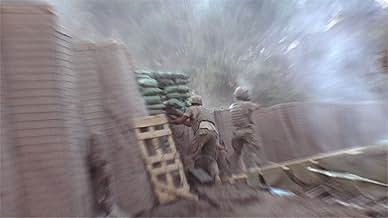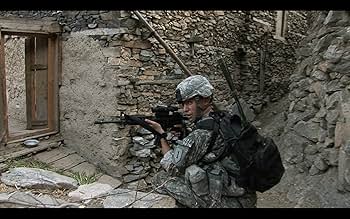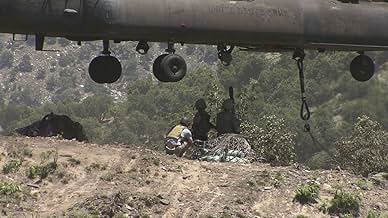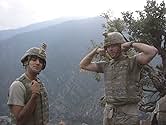IMDb रेटिंग
6.7/10
4.2 हज़ार
आपकी रेटिंग
अपनी भाषा में प्लॉट जोड़ेंKorengal picks up where Restrepo (2010) left off--with the same men, in the same valley, with the same commanders--but presents a very different look at the experience of war.Korengal picks up where Restrepo (2010) left off--with the same men, in the same valley, with the same commanders--but presents a very different look at the experience of war.Korengal picks up where Restrepo (2010) left off--with the same men, in the same valley, with the same commanders--but presents a very different look at the experience of war.
- पुरस्कार
- कुल 1 जीत
फ़ीचर्ड समीक्षाएं
I just finished reviewing "The Hornet's Nest," another film by a father and son journalist team, and I explained how I wished it was more like "Restrepo" and "Korengal."
This follow-up film to Restrepo with the filmmakers embedding with the same platoon at the same OP was equally as engaging as the original, but focused more on the other parts of war that it didn't touch on in Restrepo. This film visited the more psychological part of warfare: the mind games each and every soldier struggles with, being so bored you'd rather be in a firefight just to pass the time, or going out on patrol looking for death because you don't care anymore whether you live or die etc. It's about each soldier's individual psychological struggles and how each deals with them in their own ways.
As a journalist, I really appreciated how this film focused entirely on the soldiers and the war, letting the soldiers tell the viewer everything, rather than the filmmakers getting on-camera and explaining it to the viewer. That is where my critique of "The Hornet's Nest" was rather scathing. That film got in the way of itself, cutting back to the journalists constantly so they could get face time with the audience. I'd rather see it done how these filmmakers approached this film and Restrepo, asking the soldiers the questions and letting them answer — letting them supply the narrative, exclusively.
This film is a must-see follow-up to Restrepo as they re-embed with the same group of familiar faces for another deployment in the Korengal.
This follow-up film to Restrepo with the filmmakers embedding with the same platoon at the same OP was equally as engaging as the original, but focused more on the other parts of war that it didn't touch on in Restrepo. This film visited the more psychological part of warfare: the mind games each and every soldier struggles with, being so bored you'd rather be in a firefight just to pass the time, or going out on patrol looking for death because you don't care anymore whether you live or die etc. It's about each soldier's individual psychological struggles and how each deals with them in their own ways.
As a journalist, I really appreciated how this film focused entirely on the soldiers and the war, letting the soldiers tell the viewer everything, rather than the filmmakers getting on-camera and explaining it to the viewer. That is where my critique of "The Hornet's Nest" was rather scathing. That film got in the way of itself, cutting back to the journalists constantly so they could get face time with the audience. I'd rather see it done how these filmmakers approached this film and Restrepo, asking the soldiers the questions and letting them answer — letting them supply the narrative, exclusively.
This film is a must-see follow-up to Restrepo as they re-embed with the same group of familiar faces for another deployment in the Korengal.
While many of the reviews were mediocre this time around Junger focused on the Combat Veterans out there. This really drove home many of the emotions and feeling soldiers experience. The boredom, adrenaline, and at times hopelessness and futility. For the general public who has never been in this situation I would recommend watching Restreppo and use that as a reference. For soldiers that have experienced this type of situation, this is the film for you. It was nice seeing many of the same soldiers I served with in this film.
The overall flow is very inconsistent and that is really also the way it feels while you are facing time in the suck. There are times when the soldiers are gun ho to the point of zealotry. This is an actual tactic many use to keep themselves moving each and every day. War is a wide plethora of emotions that can change in an instant. This is a real example of just that.
The overall flow is very inconsistent and that is really also the way it feels while you are facing time in the suck. There are times when the soldiers are gun ho to the point of zealotry. This is an actual tactic many use to keep themselves moving each and every day. War is a wide plethora of emotions that can change in an instant. This is a real example of just that.
Strangely unengaging documentary.
Korengal follows the lives of a company of US Army soldiers stationed at an outpost in Afghanistan in 2007-8. It is the sequel to Restrepo, which was nominated for a Best Documentary Oscar in 2011.
Maybe it is because I haven't seen Restrepo (yet), but this documentary just doesn't work for me. It doesn't do much wrong - there is a good mix of interviews and live action footage and there is a degree of conclusiveness to it all. Yet I wasn't engaged. The whole thing just seemed to plod along and I didn't feel any real affinity towards the soldiers.
There is also a large degree of gung-ho-ness and bravado, which is a bit off-putting. The movie doesn't feel balanced enough. Maybe that's the problem.
Korengal follows the lives of a company of US Army soldiers stationed at an outpost in Afghanistan in 2007-8. It is the sequel to Restrepo, which was nominated for a Best Documentary Oscar in 2011.
Maybe it is because I haven't seen Restrepo (yet), but this documentary just doesn't work for me. It doesn't do much wrong - there is a good mix of interviews and live action footage and there is a degree of conclusiveness to it all. Yet I wasn't engaged. The whole thing just seemed to plod along and I didn't feel any real affinity towards the soldiers.
There is also a large degree of gung-ho-ness and bravado, which is a bit off-putting. The movie doesn't feel balanced enough. Maybe that's the problem.
2010's Restrepo brought the Afghanistan War in to peoples' homes, bearing visceral shots and the raw emotion of modern warfare. Photojournalist Tim Heatherington and Sebastian Junger spent ten months with Combat Outpost (COP) Restrepo's "Battle Company" reaping an inordinate amount of footage. More footage than they could place into the first documentary. A year later, Heatherington would be dead; killed by shrapnel whilst covering the 2011 Libyan Civil War. Junger felt that the copious amount of footage leftover from Restrepo lent itself to another film. Thusly, Korengal, a companion film, was born.
Where the prior of the pair seemed aimed to illustrate Chris Hedge's 2002 quote, "The rush of battle is a potent and often lethal addiction, for war is a drug, one I ingested for many years," the latter shoots to exploit a more poignant and familial sense from the footage and interviews. For those familiar with Restrepo, do not expect anything revolutionary here. What you will be seeing is footage shot during the same time period (2007-2008) using the same equipment. That said, this is in no way a strike against the film. Junger fares well in his organization of the footage and new interviews. This is an altogether new narrative.
As a piece of war journalism, it stands out as a worthy companion piece to the first film, not only elaborating on notions explored in Restrepo's 93 minute running time, but introducing new and arguably more meaningful elements. Junger succeeds in revisiting their footage, and bringing freshness to what could have become a dull supercut of Restrepo's outtakes in another man's hands. It's a damn shame Heatherington wasn't around to see this complete vision of the creation he and Junger set out upon in 2007. These two pictures have set the standard for war journalism, and will hopefully usher in a new era of the discipline.
Where the prior of the pair seemed aimed to illustrate Chris Hedge's 2002 quote, "The rush of battle is a potent and often lethal addiction, for war is a drug, one I ingested for many years," the latter shoots to exploit a more poignant and familial sense from the footage and interviews. For those familiar with Restrepo, do not expect anything revolutionary here. What you will be seeing is footage shot during the same time period (2007-2008) using the same equipment. That said, this is in no way a strike against the film. Junger fares well in his organization of the footage and new interviews. This is an altogether new narrative.
As a piece of war journalism, it stands out as a worthy companion piece to the first film, not only elaborating on notions explored in Restrepo's 93 minute running time, but introducing new and arguably more meaningful elements. Junger succeeds in revisiting their footage, and bringing freshness to what could have become a dull supercut of Restrepo's outtakes in another man's hands. It's a damn shame Heatherington wasn't around to see this complete vision of the creation he and Junger set out upon in 2007. These two pictures have set the standard for war journalism, and will hopefully usher in a new era of the discipline.
Was shown made using a kick starter which makes it that more impressive for me with such a high caliber film. Its from the same prospective as Restrepo with the same Men and the same OP, but doesn't cover death and surviving, but more of dealing with boredom, how much they look forward to firefights, and how war effects you over a period of time to a point you begin to not care if you live or die. Its more physiological as Restrepo was emotional. At times it felt as a out takes of Restrepo but it really illustrates what war feels like from a theater seat. It places itself up there with Armadillo and Restrepo. Cant wait till its released on Netflix.
क्या आपको पता है
- भाव
LaMonta Caldwell: It's just a valley. It's a valley that is if you look from high above, it looks like a quiet valley.
- साउंडट्रैकEnjoying Firefights
by Marty Beller
टॉप पसंद
रेटिंग देने के लिए साइन-इन करें और वैयक्तिकृत सुझावों के लिए वॉचलिस्ट करें
- How long is Korengal?Alexa द्वारा संचालित
विवरण
बॉक्स ऑफ़िस
- US और कनाडा में सकल
- $1,01,310
- US और कनाडा में पहले सप्ताह में कुल कमाई
- $14,630
- 1 जून 2014
- दुनिया भर में सकल
- $1,01,310
- चलने की अवधि
- 1 घं 24 मि(84 min)
- रंग
इस पेज में योगदान दें
किसी बदलाव का सुझाव दें या अनुपलब्ध कॉन्टेंट जोड़ें



































